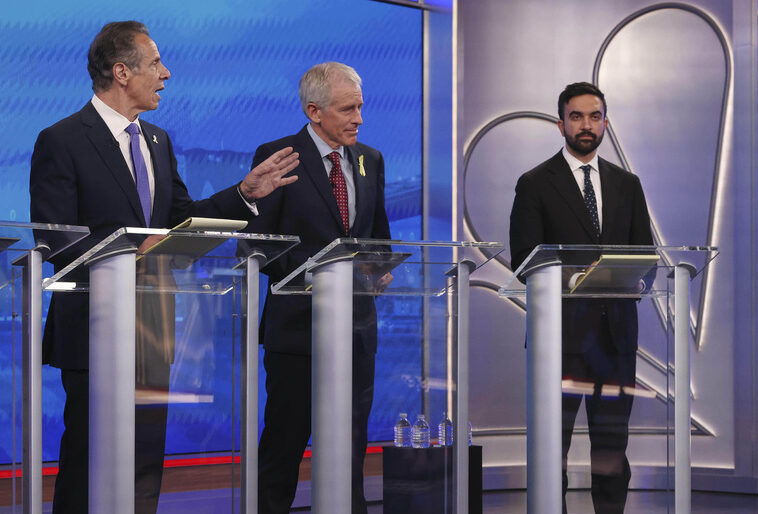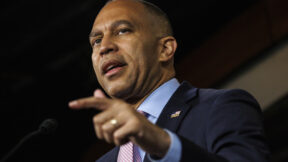NY Times Brutally Attacks Progressives, Baffles Readers With Non-Endorsement in Mayoral Race

(AP Photo/Yuki Iwamura, Pool)
The New York Times editorial board raised eyebrows on Monday with its non-endorsement in the city’s mayoral race, which still urged voters not to rank the leading progressive candidate.
In August of 2024, the paper announced it would no longer make local endorsements, but would still endorse presidential candidates “as it has for more than 160 years.” On Monday, the Times kept within that framework, publishing an article titled, “Our Advice to Voters in a Vexing Race for New York Mayor.”
The Times editorial board began by painting a grim picture of the state of New York City, warning that many residents have had that “sinking feeling” in the past decade that the city was “heading back to the bad old days of the 1970s and ’80s.”
The “Gray Lady” listed off crime, “menacing” subway rides, rising housing prices, and failing public education as worries keeping New Yorkers up at night before tearing into former progressive Mayor Bill de Blasio as having set the city back from the days of Mayor Michael Bloomberg – who they argue put the city on a better track.
The board gave de Blasio credit for expanding preschool in the city, but added, “Overall, though, he bears significant responsibility for the city’s problems. He did not take disorder seriously enough, and he set back the city’s K-12 school system. His main legacy is to have contributed to the city’s recent decline.” The Times goes on to argue that de Blasio’s failures are emblematic of progressive mayors across the country, who let their cities descend into chaos with “blasé attitudes toward crime and drug use.”
The editorial eventually gets to the current slate of Democratic primary candidates, and pulls no punches in urging New Yorkers not to vote for Zohran Mamdani – the leading progressive candidate who is just behind former Gov. Andrew Cuomo in the polls.
“Unfortunately, Mr. Mamdani is running on an agenda uniquely unsuited to the city’s challenges. He is a democratic socialist who too often ignores the unavoidable trade-offs of governance. He favors rent freezes that could restrict housing supply and make it harder for younger New Yorkers and new arrivals to afford housing. He wants the government to operate grocery stores, as if customer service and retail sales were strengths of the public sector. He minimizes the importance of policing,” the Times argued, adding:
Most worrisome, he shows little concern about the disorder of the past decade, even though its costs have fallen hardest on the city’s working-class and poor residents. Mr. Mamdani, who has called Mr. de Blasio the best New York mayor of his lifetime, offers an agenda that remains alluring among elite progressives but has proved damaging to city life.
The editorial calls Mamdani historically unprepared to the job, pointing to his age, 33, and his lack of any kind of managerial experience. The article takes on Cuomo next. “The other front-runner, Mr. Cuomo, has his own significant shortcomings. He resigned as governor in 2021, during his third term, because of allegations of sexual harassment or inappropriate touching from at least 11 women,” noted the Times, adding:
This board called for his resignation at the time because of the disturbing, credible nature of the accusations. We noted that his treatment of women was part of a larger pattern of bullying, self-serving behavior.
Many New Yorkers are nonetheless planning to vote for Mr. Cuomo, partly because of his policy record as governor.
The board also hammered embattled Mayor Eric Adams, who is running as an independent, skipping the Democratic primary where he stood little chance. The article ends by noting Brad Lander, the city’s comptroller, is a strong progressive alternative to Mamdani, while businessman Whitney Tilson is running as the next Bloomberg and is an alternative to Cuomo.
The editorial sparked anger and confusion online, as many pundits and observers fumed at the attack on Mamdani and the lack of a clear message for voters.
Below are some reactions to the editorial:
___
New: The Mediaite One-Sheet Newsletter
Your daily summary and analysis of what the many, many media newsletters are saying and reporting. Subscribe now!






Comments
↓ Scroll down for comments ↓